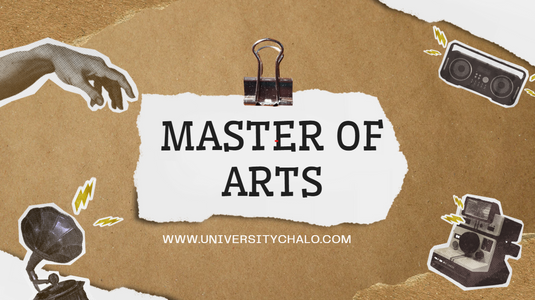MA Full Form What Makes Master of Arts Degrees Versatile for Career Growth
 Tanisha Yadav
15 Jan, 2025
10 mins read
65
Tanisha Yadav
15 Jan, 2025
10 mins read
65

When you think about higher education, one degree that stands out as highly versatile is the Master of Arts (MA). But before diving deep into what makes it such a valuable asset, let's start with the basics: what is the MA full form? The "MA" stands for Master of Arts, which is a postgraduate degree that is awarded after completing an undergraduate program, typically in humanities, social sciences, or even certain sciences. The versatility of an MA degree lies in its ability to open numerous career doors, as it provides a blend of theoretical knowledge, practical skills, and critical thinking abilities that are sought after in many industries.
Understanding the Scope of an MA Degree
The MA full form, Master of Arts, might seem like just a simple academic title, but it represents much more than that. It signifies a level of education that showcases a student’s ability to dive deeply into their field of interest. This degree allows students to specialize in a particular area within the arts and humanities, such as history, literature, sociology, psychology, or even fields like business, education, and communication.
One of the primary reasons why an MA degree is considered so versatile is the sheer variety of fields in which it can be pursued. Students can choose from subjects as diverse as fine arts, linguistics, economics, philosophy, journalism, or public policy, among others. This wide range of specializations ensures that an MA degree can cater to almost every kind of professional interest.
Skill Development with an MA Degree
An MA degree not only builds academic knowledge but also hones a set of transferable skills that are invaluable in the job market. These skills include:
- Critical Thinking: MA programs often encourage students to critically analyze and interpret complex information. This helps in developing problem-solving abilities that are applicable to any profession.
- Communication Skills: Whether through writing essays, delivering presentations, or engaging in group discussions, students improve both their written and verbal communication skills, which are crucial in most careers.
- Research Skills: An essential component of most MA courses is research. Students learn how to conduct independent research, analyze data, and synthesize information—skills that are highly valued in fields like education, policy-making, and business.
- Leadership and Collaboration: Many MA programs incorporate group projects, helping students develop leadership skills while learning to collaborate effectively with others. These skills are essential in workplaces where teamwork is key.
- Creativity: Especially in fields like arts, literature, or design, an MA degree fosters creativity. This can benefit those looking to pursue careers in creative industries such as writing, media, or the arts.
Why Pursuing an MA is Beneficial for Career Growth
One of the most significant advantages of obtaining an MA degree is the potential for career advancement. Let’s take a closer look at how a Master of Arts can boost your career prospects.
- Better Job Opportunities: Having a Master of Arts degree opens up a broader range of job opportunities. Many professions require a higher level of expertise and specialized knowledge, which an MA provides. For instance, if you pursue an MA in Psychology, you could qualify for roles in counseling, therapy, or research.
- Increased Earning Potential: While salary depends on various factors, individuals with a postgraduate degree like an MA often earn more than those with just a bachelor's degree. The specialized knowledge gained in the program can help you secure higher-paying jobs in your chosen field.
- Career Transition: If you’re looking to switch careers, an MA degree can be an excellent way to pivot. It provides you with the necessary skills and credentials to enter a new field. For example, someone with a background in science might pursue an MA in Education to become a teacher or administrator.
- Leadership Roles: An MA can help pave the way for managerial or leadership roles. The critical thinking, communication, and research skills gained during the program prepare graduates for positions that require a higher level of responsibility.
- Academic Opportunities: If you have a passion for teaching or research, an MA degree can be your stepping stone to a PhD. Many people use their Master of Arts degree as a foundation to pursue further studies and enter academia.
Flexibility and Versatility
The flexibility of MA programs is another reason why they are so appealing. Many universities offer part-time and online MA courses, making it easier for individuals to pursue their studies while working or taking care of other responsibilities. The structure of these programs allows students to tailor their studies to their interests, which is why MA degrees attract a wide range of people from various backgrounds.
Moreover, the skills and knowledge gained during an MA program are transferable across different sectors, making it easier for graduates to explore different career paths. Whether in the corporate world, the nonprofit sector, education, or government, an MA degree is versatile enough to suit various industries and job functions.
Practical Applications of an MA Degree in the Job Market
While the theoretical knowledge gained in an MA program is important, it is equally essential to consider how this knowledge is applied in real-world scenarios. Many MA programs incorporate internships, fieldwork, or capstone projects that allow students to gain practical experience in their chosen fields. This experience is invaluable as it helps bridge the gap between academic learning and professional application.
For example, an MA in Journalism might require students to work as interns for news agencies, where they can apply their writing and reporting skills in real-world settings. Similarly, an MA in International Relations may involve field research or internships with international organizations, providing students with firsthand exposure to global issues.
Conclusion
In summary, the MA full form—Master of Arts—is a degree that offers great versatility for career growth. With its wide array of specializations, skill development, and practical applications, an MA opens the door to a range of professional opportunities. Whether you’re looking to advance in your current field, switch careers, or pursue academic endeavors, an MA degree can serve as the key to unlocking your potential.
If you’re considering pursuing higher education, an MA could be the perfect choice to boost your career prospects. It not only enriches your knowledge but also equips you with skills that are highly valued in today’s competitive job market.
FAQs
1. What is the MA full form?
The MA full form stands for Master of Arts. It is a postgraduate degree in various fields, including humanities, social sciences, and arts.
2. How long does it take to complete an MA degree?
Typically, an MA degree takes about 1 to 2 years to complete, depending on the program and whether you’re studying full-time or part-time.
3. What career options are available after completing an MA degree?
Graduates of an MA program can pursue careers in education, research, counseling, public policy, journalism, business, and many other fields depending on their specialization.
4. Can I pursue an MA degree online?
Yes, many universities offer online and part-time MA programs that allow students to study while working or fulfilling other commitments.
5. Is an MA degree worth the investment?
An MA degree can be a valuable investment if it aligns with your career goals. It provides advanced knowledge, specialized skills, and opens up better job opportunities.
Written By:
Tanisha Yadav



Hotels at your convenience
Now choose your stay according to your preference. From finding a place for your dream destination or a mere weekend getaway to business accommodations or brief stay, we have got you covered. Explore hotels as per your mood.


